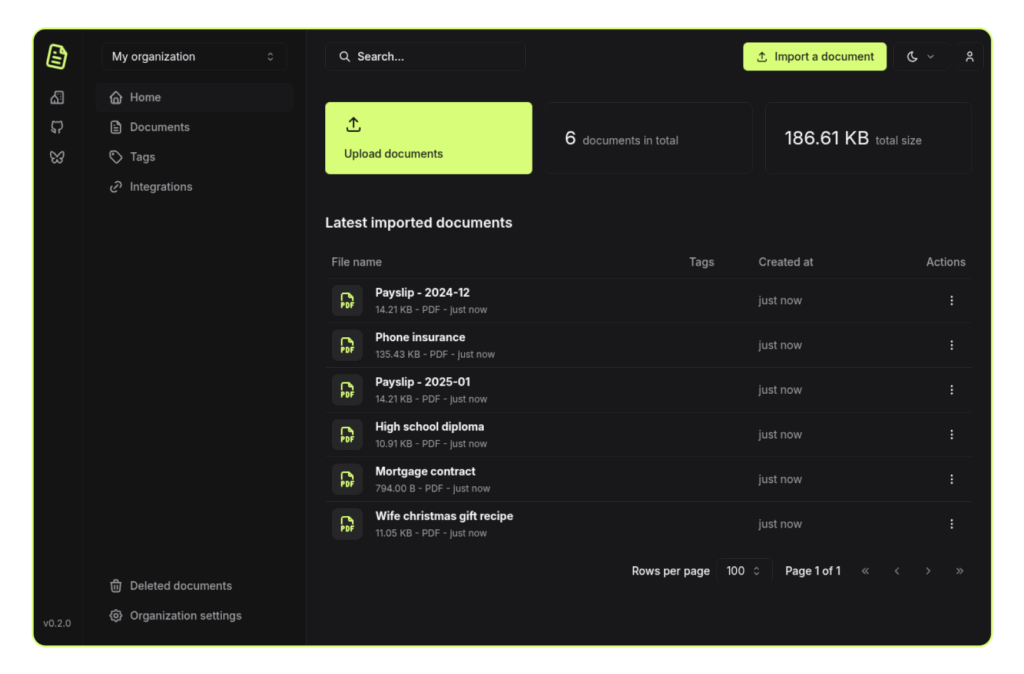Papra aims to revolutionize digital archiving with a lightweight, accessible, and fully self-hosted approach — ideal for individuals and small organizations alike.
In today’s digital age, managing receipts, warranties, contracts, or invoices can still be a hassle. While many complex or closed platforms dominate the space, Papra emerges as a simple, open-source, and powerful alternative for anyone looking to organize and retrieve their documents from any device.
What is Papra?
Papra is a minimalist document management and archiving platform, designed for users who need long-term document storage without the headaches. With a clear focus on simplicity, privacy, and extensibility, the platform blends essential features with a modern experience — available for both self-hosting or local-only use.
As its creator Corentin Thomasset explains, Papra is a tool to “forget and remember”: store a document today and retrieve it effortlessly months later with its optimized search engine.
Core Features of Papra
- Document management: Upload, store, and tag files with custom automation rules.
- Organizations: Create groups to manage documents with family, colleagues, or teams.
- Advanced search: Includes OCR-powered text extraction from scanned files or images.
- Automated import: From folders or by forwarding emails to a custom address.
- Responsive UI: Works on desktops and mobiles, with dark mode included.
- CLI, API, SDK & Webhooks: Perfect for developers and automated workflows.
- Internationalization (i18n): Multilingual support, with ongoing translation efforts (notably by @NyxJae for Chinese).
- Self-hostable via Docker: Lightweight image (<200 MB) for x86 and ARM architectures.
A live demo is available at demo.papra.app, storing data only locally with no backend required.
What’s New: Papra 4.56 Highlights
From versions 4.51.0 to 4.56.2, Papra has introduced a host of improvements:
- Quick AI Model Selector to switch between models without leaving the chatbox.
- Smart Git Commit Messages generated from unstaged changes.
- Autocomplete API Configuration to define which AI handles suggestions.
- Grok 4 Support, integrating X’s latest LLM into Papra.
- Timer-Based Auto-Approval and Import/Export Configuration Tools.
- MCP Notifications and improved contextual error feedback.
These features position Papra as more than a document platform — it’s becoming a flexible workflow companion.
Built for Self-Hosting
Papra is especially appealing for users seeking full data ownership. Deployment is quick and easy:
docker run -d --name papra -p 1221:1221 ghcr.io/papra-hq/papra:latest
The stack includes SolidJS, HonoJS, and Drizzle ORM, along with modern infrastructure like Turso DB, Cloudflare Pages, and Render, ensuring a smooth and reproducible experience.
A Thriving Open-Source Community
Like all great open-source projects, Papra grows thanks to its contributors. From API configuration by @alexandrevilain to continuous Chinese localization by @NyxJae, the project actively engages with its community. Contributors receive lifetime credits as a token of appreciation.
Final Thoughts
In a world where document management is often over-engineered or neglected entirely, Papra provides a clean, efficient, and fully open-source solution. Constantly evolving, privacy-conscious, and community-driven, it’s ideal for anyone who wants to archive, search, and retrieve documents without losing control or ease of use.
More info and source code: https://github.com/papra-hq/papra
Join the Discord: discord.gg/papra
Official site: https://papra.app

